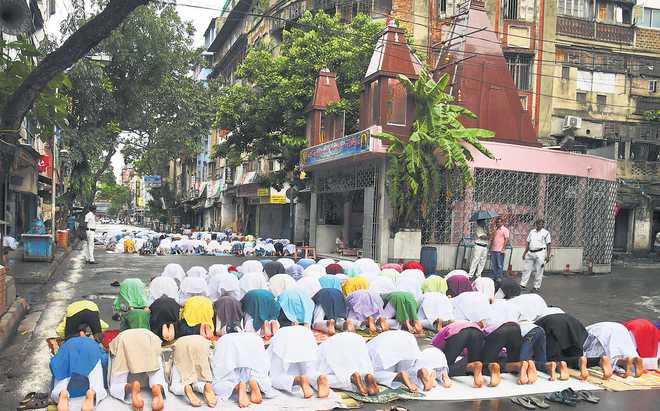
FREEDOM OF RELIGION: Our respect of all religions is based on tolerance, something that is increasingly in short supply. AFP
Roopinder Singh
THE seeds of evil are sown when any group of people is looked at homogenously. They bloom when the group is regarded as "the other." History is replete with examples of how a particular section of society was demonised as 'the other' and then damned. Yet, we human beings are condemned to repeat history since we fail to learn from it.
Chief Minister Manohar Lal Khattar's message to the people of Haryana on the eve of his departure from India to Israel and the UK is not one that would ensure calm while he is away. It was one that reassured his core constituency about his commitment to the cause. The CM told the Press that "namaz should be performed in mosques and idgahs."
The statement sets the tone for his state's administrators since it comes soon after namaz was disrupted by individuals connected to the right-wing Hindu organisations in Gurugram. Thereafter, prayers were offered by Muslims under police protection, mercifully without any subsequent clashes.
In a feeble attempt at damage control, a carefully worded statement was later released in which it was clarified that the CM had "never said anything regarding stopping anyone from offering namaz."
Let's take the CM's original statement to its logical conclusion. Is he suggesting that there should be no public display of religious ceremonies? If we were to apply it to all religious, it would imply that all adherents of all religions should not use any public space for offering prayers or observing religious functions. They should pray in the confines of temples, mosques and churches that are built for them. Would we not then be banning religion from public spaces in a country where it is so much a visible part of the way people express themselves? The jagrans, nagar kirtans, singing of Christmas carols on the streets, tazias, all these are public displays of religious beliefs and rites, and they make the country so much the richer.
The role of the state in our country has been of balancing the interaction between various communities even as it ensures that the fundamental right to freedom of religion, granted under Article 25-28 of the Constitution, is safeguarded. Secularism in India is rooted in the precept of equal respect for all religions. This is so because of our proud history; four major religions — Hinduism, Buddhism, Jainism and Sikhism — started here.
True, there are other interpretations of secularism, but these too are rooted in the local history and culture. The domination of the Catholic church in affairs of the State led to a backlash from the rulers and the people, as a result of which separation of the Church and the State is practised in most of Europe and in the USA. The French Revolution shaped the French interpretation of laicité, a strident form of secularism that is now used to stamp out religion and religious symbols to preserve secularity in the country.
Our respect of all religions is based on tolerance, something that is increasingly in short supply. Secular expression needs to be more strident to combat the narrow bigoted mindsets that stain our nation today. Much of it is tainted by the 'them' mindset, where the other is demonised. The actions of those who violate the law are sought to be trivialised. Is it a coincidence that the disrupters of namaz in Gurugram were released on bail shortly after they were arrested, and the latter happened after much hue and cry was raised?
The government behaviour leaves it open to the charge of exceptionalism, where one group believes that it can be treated differently from other members of society, because of its 'exceptional' nature.
It could well be argued that evil starts when we make an exception of ourselves. Our society is based on a certain perception — things will get done our way if we know people. Individually, it is when we request an official to 'adjust', to 'help', to 'overlook' our transgression. Collectively, it is when we justify actions of those we perceive as "our boys" and condemn the other.
We must get out of the ghettos we have built in our minds and let in the freshness of diversity into our thoughts. The government is wrong in believing that the lowest common denominator of behaviour is all it needs to address. It is wrong in believing that we are uncaring individuals. The onus is on us as individuals to show that such regressive thought is wrong. We can, and must, raise our voice against the one-sided cacophony of disharmony that is disrupting the unity of our nation. This is our moral duty to ourselves.



























